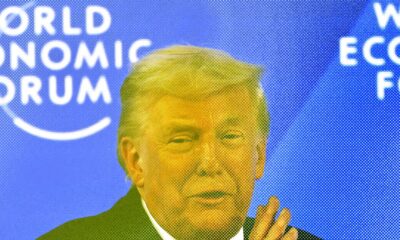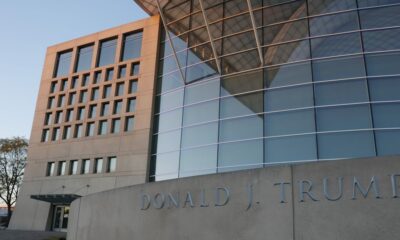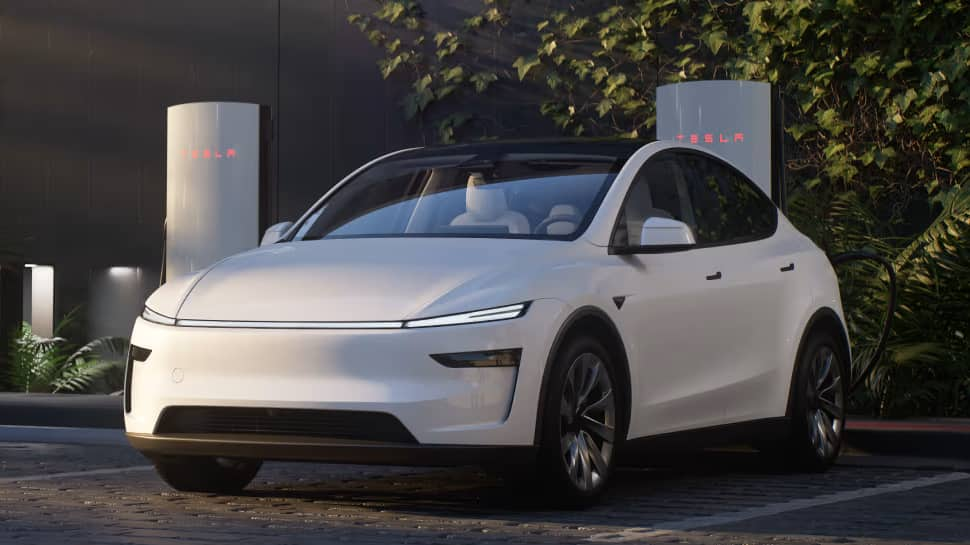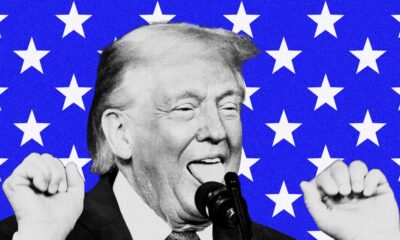Business
Who is the world’s richest person? Elon Musk snatches back crown from Larry Ellison; check their net worth – The Times of India

Larry Ellison, Oracle’s Chief Technology Officer, overtook Elon Musk to become the world’s richest person on Wednesday – albeit temporarily. The current wealth gap between these titans stands at a relatively modest one billion pounds, considering their enormous net worth: Musk maintains $384.2 billion whilst Ellison holds $383.2 billion.According to an AP report, these astronomical sums could sustain 5 million average American households for an entire year, equivalent to Florida’s population taking a complete break from work. Alternatively, the amount matches South Africa’s annual gross domestic product.
When Larry Ellison overtook Elon Musk as world’s richest
In the initial minutes of trading, Oracle Corp.’s share price increased dramatically, momentarily elevating its co-founder Ellison above the long-standing leader Elon Musk in the world’s wealthiest persons rankings.However, the volatile nature of the stock market restored Musk to the position of the world’s richest person by day’s end, according to Bloomberg, as Oracle’s shares settled lower than their earlier peak.At Wednesday’s close, Oracle shares rose 36% to $328.33, whilst Tesla showed minimal movement, increasing less than 1% to $347.79.The temporary shift in rankings occurred following Oracle’s exceptional earnings report, which highlighted substantial customer orders amidst increasing competition in artificial intelligence technology.Larry Ellison ascended to become the wealthiest individual globally, surpassing Elon Musk, who had held this position since four years prior. Musk’s position was primarily attributed to his ownership in Tesla, an electric vehicle manufacturer that is currently experiencing a decline.Tesla’s shares have declined by 14% in the current year, displaying a contrasting trajectory to Oracle’s performance. Musk maintains control over numerous private enterprises, including the spacecraft manufacturer SpaceX, his AI venture xAI, and X (previously known as Twitter).Ellison’s 40% ownership in Oracle resulted in his wealth increasing by $100 billion within thirty minutes of market opening! The previous evening, post market closure, Oracle disclosed securing contracts exceeding $300 billion, including agreements with “OpenAI, Meta, Nvidia and Musk’s xAI”. The company projected its cloud infrastructure revenue to increase by 77% to $18 billion this fiscal year, followed by an anticipated rise to $144 billion over the subsequent four-year period.Ellison said in an earnings discussion how the company would generate revenue not only from AI development infrastructure but also from operating AI systems across various sectors, including manufacturing, pharmaceutical research, financial trading, and business automation.The substantial increase in Ellison’s wealth on Wednesday morning reflected market confidence in automation replacing human workforce, positioning Oracle to capitalise on this transformation.“AI Changes Everything,” declared the 81-year-old during the discussion.Meanwhile, Tesla’s chief executive faces challenges in persuading investors despite similar aspirations. Following a significant decline in electric vehicle sales early this year, the anticipated recovery hasn’t materialised. He has attempted to redirect attention towards Tesla’s robotics division and AI developments in autonomous vehicles.Despite his continued optimism about Tesla’s prospects, difficulties persist. The company experienced a 40% decline in European Union sales during early summer, marking seven consecutive months of reduction, partly due to his social media support for far-right politicians. US market share has also declined as customers responded negatively to his alignment with Donald Trump.
Business
Harry Styles and Anthony Joshua among UK’s top tax payers

The former One Direction member-turned-solo artist appears on the Sunday Times list for the first time.
Source link
Business
From Manufacturing To Infra And AI: Capex Boost Flags Off Budget 2026 ‘Reforms Express’

Last Updated:
Budget 2026: FM Nirmala Sitharaman gives a strong push to manufacturing, infrastructure and job creation, while proposing a simpler tax and customs system.

Finance Minister Nirmala Sitharaman presents the Union Budget 2026-27.
Budget 2026 Takeaways: Finance Minister Nirmala Sitharaman on Sunday presented the Union Budget 2026-27, giving a strong push to manufacturing, infrastructure and job creation, proposing a simpler tax and customs regime, and hailing the government’s modernisation drive as a “reforms express”.
The Budget 2026 is anchored around three ‘kartavyas’ — driving growth by enhancing productivity and competitiveness, building people’s capacity, and ensuring inclusive development under the vision of Sabka Saath, Sabka Vikaas.
In her ninth consecutive Budget in Parliament, Sitharaman laid out a multi-pronged strategy to sustain growth amid global uncertainty, including expanding domestic electronics and semiconductor capabilities, de-risking infrastructure projects, skilling India’s youth for emerging technologies, and easing compliance for taxpayers and importers.
Here are the key takeaways from Budget 2026 across manufacturing, infrastructure, skills, AI, taxation and customs duty.
Manufacturing Gets A Boost
Budget 2026 put a special emphasis on the manufacturing landscape in India. The outlay for electronics components manufacturing was raised sharply to Rs 40,000 crore, while new schemes for rare earth magnets, chemical parks, container manufacturing and capital goods seek to reduce import dependency, and strengthen domestic supply chains. Textiles got an integrated, employment-oriented package covering fibres, clusters, skilling and sustainability.
Infrastructure-Led Growth
Infrastructure got a boost with a higher capex allocation and initiatives like a risk guarantee fund to de-risk projects for private developers, new dedicated freight corridors and national waterways, dedicated REITs (real estate investment trusts) for recycling of significant real estate assets of central public sector enterprises (CPSEs), and a seaplane VGF (viability gap funding) scheme.
The Centre’s capital expenditure (capex) target has been increased to Rs 12.2 lakh crore for FY27, up from Rs 11.2 lakh crore earmarked for the current financial year. Moreover, maintaining the fiscal discipline, Sitharaman said the government expects the fiscal deficit to be at 4.3 per cent of the GDP in 2026-27, lower than 4.4 per cent projected for the current financial year.
Tier-II and Tier-III cities were placed at the centre of urban growth via City Economic Regions, backed by reform-linked funding.
“We shall continue to focus on developing infrastructure in cities with over 5 lakh population (Tier II and Tier III), which have expanded to become growth centres,” Sitharaman said in her Budget Speech.
Greater Emphasis On Skilling
The Budget placed renewed emphasis on the services economy as a jobs engine. A high-powered Education-to-Employment and Enterprise Committee will realign skilling with market needs, including the impact of emerging technologies.
Content creation and creative industries get a boost through AVGC labs in schools and colleges, support for animation, gaming and comics, and new institutional capacity for design and hospitality. Tourism-linked skilling, from guides to digital heritage documentation, signals a clear intent to convert culture and content into employment and exports.
“I propose to support the Indian Institute of Creative Technologies, Mumbai in setting up AVGC Content Creator Labs in 15,000 secondary schools and 500 colleges,” FM Sitharaman said. AVGC stands for animation, visual effects, gaming and comics.
AI & Semiconductors Push
Artificial intelligence (AI) was positioned as a cross-sector force multiplier rather than a standalone theme. The Budget provided a push to artificial intelligence (AI) by promoting adoption with governance, agriculture, education and skilling, including proposals for AI-enabled advisory tools for farmers and AI integration in education curricula.
On hardware, the semiconductor strategy expanded decisively under ISM 2.0 (India Semiconductor Mission 2.0), with focus on domestic equipment manufacturing, materials, research centres and workforce development, signalling a long-term commitment to building a resilient chip ecosystem in India.
Taxation, ITR, TDS, TCS
A major structural reform comes with the Income Tax Act, 2025, effective April 1, 2026, containing simpler rules and redesigned forms.
Budget 2026 provided compliance relief for individuals, including extended timelines for revising returns to March 31 from December 31 earlier, staggered ITR due dates, and easier filing of Form 15G/15H through depositories.
Individuals with ITR-1 and ITR-2 returns will continue to file till July 31, and non-audit business cases or trusts are proposed to be allowed time till August 31, according to the Budget Speech 2026-27.
“I propose to extend time available for revising returns from 31st December to up to 31st March with the payment of a nominal fee. I also propose to stagger the timeline for filing of tax returns. Individuals with ITR 1 and ITR 2 returns will continue to file till 31st July and non-audit business cases or trusts are proposed to be allowed time till 31st August,” Sitharaman said.
TDS (Tax deducted at source) rules were clarified for manpower services, while a rule-based system for lower or nil TDS certificates is proposed. TCS rates were cut to 2% for overseas tour packages, education and medical expenses under liberalised remittance scheme (LRS). Litigation is targeted through integrated assessment and penalty orders, lower pre-deposit requirements, and wider immunity provisions.
TDS on the sale of immovable property by a non-resident will be deducted and deposited through resident buyer’s PAN (Permanent Account Number)-based challan instead of requiring TAN (Tax Deduction and Collection Account Number), Sitharaman said.
Customs Duty Tweaks
Customs duty rationalisation continued with a clear focus on domestic manufacturing, energy transition and ease of living. Exemptions have been extended or introduced for capital goods used in lithium-ion batteries, critical minerals processing, nuclear power projects and aircraft manufacturing.
Personal imports will become cheaper with a reduction in duty on goods for personal use from 20% to 10%. Seventeen cancer drugs and additional rare-disease treatments were exempted from customs duty. Process reforms aimed at trust-based, tech-driven clearances, faster cargo movement and lower compliance costs, especially for exporters and MSMEs (micro, small, medium and enterprises).
STT On F&O Hiked
The Budget increased securities transaction tax (STT) on futures trading from 0.02% to 0.05% and on options trading from 0.10% to 0.15%, a move that upset the capital markets with the BSE Sensex crashing more than 2,300 points from the day’s high and the NSE Nifty dropping to 24,571.75.
Securities Transaction Tax (STT) is a direct tax imposed on the buying and selling of securities in India.
Commenting on the Budget, Prime Minister Narendra Modi said, “The Union Budget reflects the aspirations of 140 crore Indians. It strengthens the reform journey and charts a clear roadmap for Viksit Bharat.”
February 01, 2026, 14:43 IST
Read More
Business
Air India resumes direct Shanghai-New Delhi flights after nearly six years

Shanghai (China): The Consulate General of India in Shanghai welcomed the resumption of Air India’s direct flight services between Shanghai and New Delhi, marking a major step forward in restoring people-to-people, business and institutional connectivity between India and China.
According to an official release, the inaugural Shanghai-New Delhi flight departed today from Shanghai Pudong International Airport, carrying over 230 passengers on board the Boeing 787 aircraft. The relaunch comes after a gap of nearly six years and represents a significant milestone in normalising bilateral air connectivity following the suspension of services in early 2020.
Speaking on the occasion, Consul General Pratik Mathur said, “The resumption of direct flights between Shanghai and New Delhi is a tangible expression of the renewed momentum in India-China engagement. Enhanced air connectivity is essential for facilitating trade, tourism, academic exchanges and people-to-people contacts, particularly between India and East China. We are pleased to see Air India restoring this important link.”
As per a release, Air India will operate the route four times a week using its Boeing 787-8 Dreamliner aircraft, featuring modernised cabins and enhanced onboard services. The restored service reflects the growing demand for travel between the two countries and the steady recovery of cross-border mobility. It will also support commercial, educational and cultural exchanges between India and the Yangtze River Delta region, one of China’s most economically dynamic clusters.
The Consulate General of India in Shanghai remains committed to supporting initiatives that strengthen connectivity and deepen cooperation across trade, investment, tourism, education and cultural exchange, the release stated.
-

 Sports5 days ago
Sports5 days agoPSL 11: Local players’ category renewals unveiled ahead of auction
-

 Tech1 week ago
Tech1 week agoThis Mega Snowstorm Will Be a Test for the US Supply Chain
-

 Entertainment5 days ago
Entertainment5 days agoClaire Danes reveals how she reacted to pregnancy at 44
-

 Tech1 week ago
Tech1 week ago‘Uncanny Valley’: Donald Trump’s Davos Drama, AI Midterms, and ChatGPT’s Last Resort
-

 Fashion1 week ago
Fashion1 week agoSpain’s apparel imports up 7.10% in Jan-Oct as sourcing realigns
-

 Tech1 week ago
Tech1 week agoICE Asks Companies About ‘Ad Tech and Big Data’ Tools It Could Use in Investigations
-

 Sports5 days ago
Sports5 days agoCollege football’s top 100 games of the 2025 season
-

 Fashion1 week ago
Fashion1 week agoTurkiye cuts benchmark rate to 37%, flags confidence on inflation















